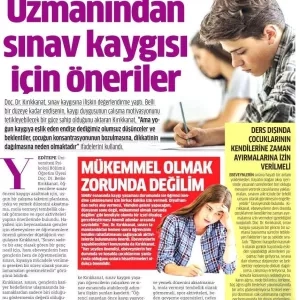Ways to Manage Exam Anxiety

Students often study day and night, learn, and memorize to succeed in exams, but when the exam day arrives, they may forget what they know due to intense anxiety. This scenario, summarizing exam anxiety, is experienced by many students, preventing them from reaping the rewards of months of effort.
Experts say that while it is not wrong to worry about exams, if anxiety hinders your daily activities, seeking professional help is recommended.
Assoc. Prof. Dr. Berke Kırıkkanat, a faculty member of the Psychology Department at Yeditepe University, highlighted the potential motivational benefits of a certain level of anxiety while highlighting the problems caused by intense anxiety. He explained ways to cope with exam anxiety.
"To a certain extent, anxiety can trigger the motivation to study," noted Assoc. Prof. Dr. Kırıkkanat. "However, the negative thoughts and expectations that accompany intense anxiety can disrupt a child's concentration and cause distractions. Additionally, intense anxiety often comes with strong emotional reactions, such as heart palpitations, trembling hands, and similar physical responses, leading to adverse outcomes," he added.
"Not a Battleground"
Highlighting the crucial roles of parents and teachers for young people excited about their dreams, Kırıkkanat stated, "For a young generation that views exams as merely a tool, both parents, youth, and teachers should not interpret exams as a fiercely competitive process. The true value lies in showing young people that exams are just one of the steps towards achieving their career goals. This approach can facilitate anxiety management."
"Taking Breaks Is Not Laziness"
Providing information on steps children experiencing exam anxiety can take, Berke Kırıkkanat advised, "Steps to take before the exam include planning a study schedule that suits their personal style, maintaining regular sleep and eating patterns, not viewing breaks as laziness, engaging in physical activities like sports, body relaxation exercises, and breathing exercises."
What to Do During the Exam?
If experiencing anxiety during the exam, Kırıkkanat suggested the following actions: "Allowing themselves a few minutes to calm down, practicing diaphragmatic breathing, and engaging in positive self-talk with phrases like 'I will do my best, it's not the end of the world, I don't have to be perfect' are important steps.”
After the Exam...
After completing the exam, Assoc. Prof. Dr. Kırıkkanat recommended that students relax: "Rewarding themselves and avoiding comparing answers with friends are initial steps that can benefit them. Reviewing mistakes and identifying areas to focus on should be done after a certain period following the exam."
"The Exam Should Not Be Portrayed as a Family Threat"
Offering suggestions on what parents can do, Berke Kırıkkanat underlined, "Most importantly, parents need to make their children feel that they are there for them under any circumstances. By approaching their children with the message that the exam is just a routine part of life without attributing a life-or-death significance to it, parents can prevent the exam from being perceived as a threat within the family."
"Not 'Don't Embarrass Us,' but 'We Are Always Here for You'"
Assoc. Prof. Dr. Kırıkkanat stressed that parents should allow their children to take time for themselves outside of studying. "Carrying out planned social activities together to spend quality time can facilitate healthy communication among family members. Therefore, parents' attitudes and behaviors towards their children during this process give them an idea of the significance of the exam. Instead of a 'Don't embarrass us' mentality, parents should adopt an attitude of 'No matter what, we are here for you, and the exam result does not determine your value in anyone's eyes.'
When to Seek Professional Help?
Kırıkkanat listed the factors that should trigger the process of seeking professional help for a young person experiencing exam anxiety: "If anxiety prevents them from performing daily activities they used to do (e.g., personal self-care, social communication, daily study routines, etc.); if their attention is distracted due to negative thoughts and expectations about the exam, leading to procrastination and refusal to discuss the topic; if there is an increase in physical complaints (stomach pain, nausea, sweating, headaches, etc.), or a decrease in physical energy; and if a decline in performance is observed despite hard work, professional help should be sought."
